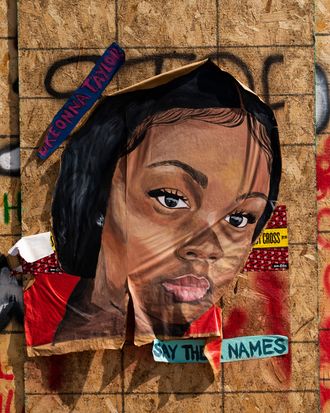
Nothing related to the outcome of police killings surprises me anymore. When I read the Louisville mayor had declared a state of emergency ahead of the grand jury’s announcement regarding the police-killing of Breonna Taylor, I knew what that declaration meant. I knew the grand jury’s decision would be one likely to cause unrest, that it would be the complete opposite of “Justice for Breonna.”
The day the decision was announced, I was working from home and helping my son with virtual school. My second-grader had started a section in his reading class called “Government at Work.” To introduce the concepts of the new text, his teacher asked the kids to skim the table of contents and let her know what questions they had based on the title of each article. Their little voices rang, “Why did the president make the government?” and “What does the government do?” and “What does a police officer do?” Foreboding and intuition blanketed my mood as I observed my little Black boy-child learning the basics of how this government should work, and it felt as though their questions were less about the text and more about what was on my mind.
A little more than an hour later, it was announced that the grand jury had only indicted one officer, and not for her murder, but for wanton endangerment. Of course, I thought. I’d been right.
Yesterday was not the first time I’ve asked myself, What does a police officer do? I am sure I will ponder it for the rest of my life. The famed slogan is “to protect and serve,” but most people of color, most Black people, and especially, most Black women, know that the police do not protect and certainly do not serve our communities. So, what do they do? If I based the answer on the circumstances of Breonna Taylor’s murder, I would say that they shoot Black women in their own homes. If I were to answer based on George Floyd’s death, I would say that they kill Black men in the street in broad daylight. If I were to base an answer on the whole of history, I’d say that they murder and disproportionally incarcerate Black people.
I may not have a concrete answer to this fundamental question. But I do know that outcomes like what happened in this case are part and parcel to my understanding of what a police officer does. A police officer does not pay for his actions. The experience of living in this Black and female body for 40 years has taught me to never be surprised by outcomes like this. I often think of Tressie McMillan Cottom’s essay “Know Your Whites,” from her book Thick. “If you know your whites,” she writes, “disappointment rarely darkens your door.” To me, “knowing your whites” means knowing your oppressor, especially in instances like this. Especially when the Kentucky attorney general is a Black man, one very much invested in his role as a Trump-supporting progeny of Mitch McConnell.
While I am not surprised or disappointed in the sense that I had any faith that justice would be done for Breonna, there is still heartbreak. Because while I knew, intellectually, what the outcome would be, I still held some hope that I’d be proven wrong. I am sad that this was the outcome, that this continues to always be the outcome, and I struggle with wanting to give in to the resignation that comes with this emotion.
I don’t want to be resigned. I don’t want to be complacent. I want to believe that my vote matters. I want this country to value me. I want justice. Because despite all the evidence that tells me that this country does not love me, I love it. So, to be resigned means that I am giving up on this relationship, that I am settling for treatment I do not deserve, that I’ll accept the status quo. My heart just cannot allow that, no matter how often it gets broken.
Resignation occurs when there’s no hope. I struggle with this because hope feels unrealistic, and Black women are nothing if not realistic. It’s hard to imagine a time when the police do not murder or beat or incarcerate and then not pay for it, because it is hard to imagine what this country could look like if it were to abolish the police and the policies that support the criminal injustice system. It is hard to imagine that a child in the second grade could answer the question “What do police officers do?” with the word help and have it be true.
But what do I do with this realism? How do I reconcile the desire to hope while also knowing my whites, knowing my oppressors? These questions feel as foundational as those asked by my 7-year-old, and even more impossible to answer.

